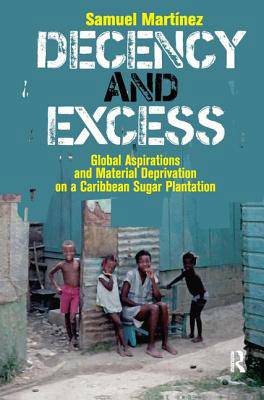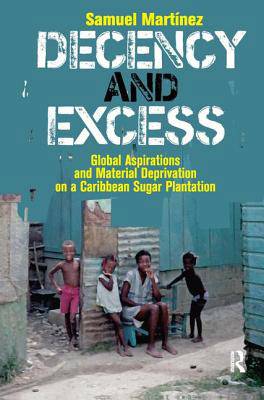
- Afhalen na 1 uur in een winkel met voorraad
- Gratis thuislevering in België vanaf € 30
- Ruim aanbod met 7 miljoen producten
- Afhalen na 1 uur in een winkel met voorraad
- Gratis thuislevering in België vanaf € 30
- Ruim aanbod met 7 miljoen producten
Zoeken
Decency and Excess
Global Aspirations and Material Deprivation on a Caribbean Sugar Plantation
Samuel Martinez
Hardcover | Engels
€ 442,95
+ 885 punten
Uitvoering
Omschrijving
Based on periodic ethnographic fieldwork over a span of fifteen years, Martinez shows how impoverished plantation dwellers find ways of coping with the alienation that would be expected while laboring to produce goods for the richer countries. Despite living in dire poverty, these workers live in a thoroughly commodified social environment. Ritual, eroticism, electronic media, household adornment, payday-weekend "binging" are ways even chronically poor plantation residents dream beyond reality. Yet plantation residents' efforts to live decently and escape from the dead hand of necessity also deepen existing divisions of ethnic identity and status. As the divide between "haves" and "have-nots" worsens as a result of neoliberal reform and the decline of sugar in international markets, this book reveals on an intensely human scale the coarsening of the social fabric of this and other communities of the world's poorer nations.
Specificaties
Betrokkenen
- Auteur(s):
- Uitgeverij:
Inhoud
- Aantal bladzijden:
- 242
- Taal:
- Engels
Eigenschappen
- Productcode (EAN):
- 9781594511875
- Verschijningsdatum:
- 1/02/2007
- Uitvoering:
- Hardcover
- Formaat:
- Ongenaaid / garenloos gebonden
- Afmetingen:
- 162 mm x 235 mm
- Gewicht:
- 462 g

Alleen bij Standaard Boekhandel
+ 885 punten op je klantenkaart van Standaard Boekhandel
Beoordelingen
We publiceren alleen reviews die voldoen aan de voorwaarden voor reviews. Bekijk onze voorwaarden voor reviews.







